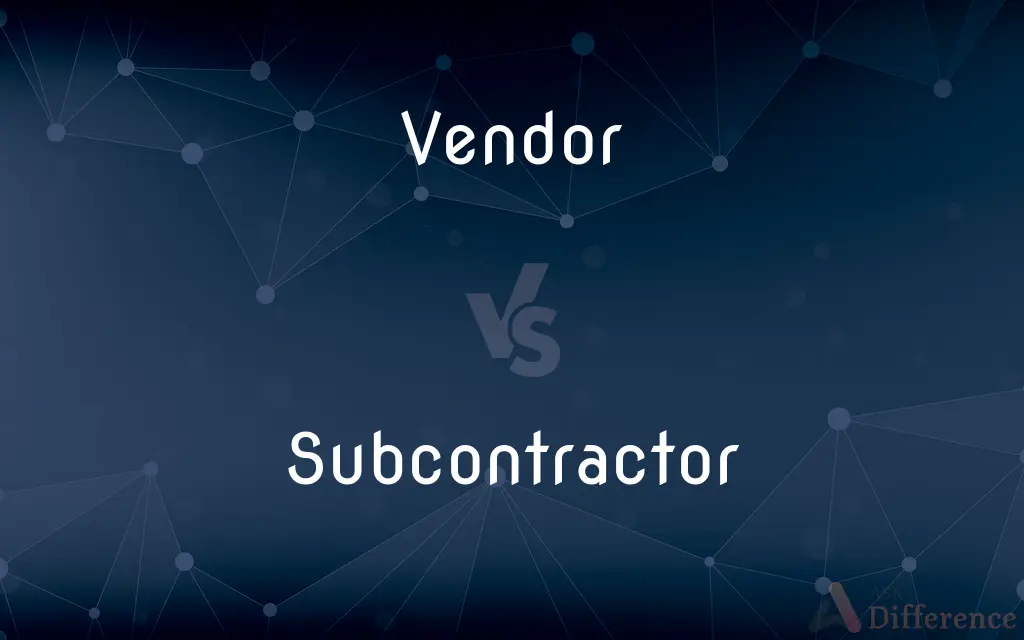Vendor vs. Subcontractor — What's the Difference?
By Tayyaba Rehman — Published on October 29, 2023
A vendor sells products or services, while a subcontractor is hired to perform tasks or services as part of a larger project.

Difference Between Vendor and Subcontractor
Table of Contents
ADVERTISEMENT
Key Differences
Vendor and Subcontractor represent different roles typically in a business or construction environment. A vendor is usually an entity that sells goods or services, usually to end consumers or other businesses. The term “vendor” emphasizes the act of selling, and the goods or services sold are usually completed and ready for use or consumption. Vendors play a pivotal role in supply chains, offering products or services that businesses or consumers need, serving as a crucial point of purchase in various markets.
On the other hand, a subcontractor is a type of contractor, usually in the construction industry, hired by a general or primary contractor to perform specific tasks or services as part of a larger project. Unlike vendors, subcontractors are more integrated into the projects they work on, often contributing specialized skills or services to complete a portion of the project. They have a more direct involvement in the development or construction process, adding value through their specialized contributions to the project's completion.
Vendors are characterized by their transactional nature, emphasizing sales and the provision of products or services. They are typically external entities that offer goods or services for purchase, providing a crucial supply to meet market demands. Their role is essential in ensuring the availability of goods or services and in facilitating business operations through supply provision.
Subcontractors, in contrast, are characterized by their contributive role in projects. They are often specialists in their field, providing specific services or skills needed to complete a portion of a larger project. Their involvement is characterized by a collaborative approach, working closely with other contractors and project stakeholders to achieve the project's goals and objectives.
To summarize, while vendors focus on selling goods or services, subcontractors are specialists hired to contribute their skills or services to a larger project. The former is transactional and supply-oriented, while the latter is contributive and project-oriented.
ADVERTISEMENT
Comparison Chart
Role
Sells goods or services
Performs tasks as part of a project
Engagement Type
Transactional
Contributive
Involvement
Supply of goods or services
Direct involvement in projects
Relationship
Buyer-Seller relationship
Contractual relationship with a contractor
Industry Context
Various industries
Often associated with construction
Compare with Definitions
Vendor
An entity that sells goods or services.
The vendor supplied the required software for the project.
Subcontractor
A contributor of specialized services or skills in a project.
The subcontractor completed the roofing efficiently.
Vendor
A seller in various markets.
The street vendor offered a variety of delicious snacks.
Subcontractor
An individual or business that works under a contractual agreement with a contractor.
The subcontractor meticulously carried out the painting job.
Vendor
A business that provides goods or services to consumers or other businesses.
The vendor ensured timely delivery of the products.
Subcontractor
A specialist hired to perform tasks as part of a larger project.
The subcontractor was responsible for the plumbing work.
Vendor
In a supply chain, a vendor, or a seller, is an enterprise that contributes goods or services. Generally, a supply chain vendor manufactures inventory/stock items and sells them to the next link in the chain.
Subcontractor
An entity contracted by a primary contractor to provide specific services.
The general contractor hired a subcontractor for the electrical work.
Vendor
A person or company offering something for sale, especially a trader in the street
An Italian ice-cream vendor
Subcontractor
A subcontractor is an individual or (in many cases) a business that signs a contract to perform part or all of the obligations of another's contract. A subcontractor (or sub-contractor) is a company or person whom a general contractor, prime contractor or main contractor hires to perform a specific task as part of an overall project and normally pays for services provided to the project.
Vendor
One that sells or vends something
A street vendor.
A vendor of software products on the Web.
Subcontractor
One who agrees to perform part of the work specified in a previous contract between a contractor and another party.
Vendor
One that provides products or services to a business for a fee.
Subcontractor
A contractor hired by a general contractor employed by the contractor rather than directly hired by the customer.
Vendor
A vending machine.
Subcontractor
One who takes a portion of a contract, as for work, from the principal contractor.
Vendor
A person or a company that vends or sells.
Subcontractor
Someone who enters into a subcontract with the primary contractor
Vendor
A vending machine.
Subcontractor
A professional providing a subset of services for a project’s completion.
We need a skilled subcontractor for the landscaping.
Vendor
To bundle third-party dependencies with the source code for one's own program.
I distributed my application with a vendored copy of Perl so that it wouldn't use the system copies of Perl where it is installed.
Vendor
As the software vendor, to bundle one's own, possibly modified version of dependencies with a standard program.
Strawberry Perl contains vendored copies of some CPAN modules, designed to allow them to run on Windows.
Vendor
A vender; a seller; the correlative of vendee.
Vendor
Someone who promotes or exchanges goods or services for money
Vendor
A supplier providing products for sale.
The company is a leading vendor of computer hardware.
Vendor
A seller or supplier in a supply chain.
We need to find a reliable vendor for office supplies.
Common Curiosities
Can a vendor be considered as a supplier?
Yes, a vendor is typically considered a supplier, providing goods or services to consumers or other businesses.
Do vendors and subcontractors serve different roles?
Yes, vendors sell products or services, and subcontractors perform tasks as part of larger projects.
Do subcontractors often specialize in specific fields or services?
Yes, subcontractors often specialize in specific fields or services, contributing their expertise to larger projects.
Is a subcontractor usually hired by a general contractor?
Yes, subcontractors are usually hired by general or primary contractors to perform specific tasks in a project.
Can a vendor operate in various markets?
Yes, vendors can operate in various markets, selling a wide range of products or services.
Is the role of a vendor primarily transactional?
Yes, the role of a vendor is primarily transactional, focusing on the sale of goods or services.
Share Your Discovery

Previous Comparison
Soya vs. Soy Sauce
Next Comparison
Frugality vs. ThriftinessAuthor Spotlight
Written by
Tayyaba RehmanTayyaba Rehman is a distinguished writer, currently serving as a primary contributor to askdifference.com. As a researcher in semantics and etymology, Tayyaba's passion for the complexity of languages and their distinctions has found a perfect home on the platform. Tayyaba delves into the intricacies of language, distinguishing between commonly confused words and phrases, thereby providing clarity for readers worldwide.
















































